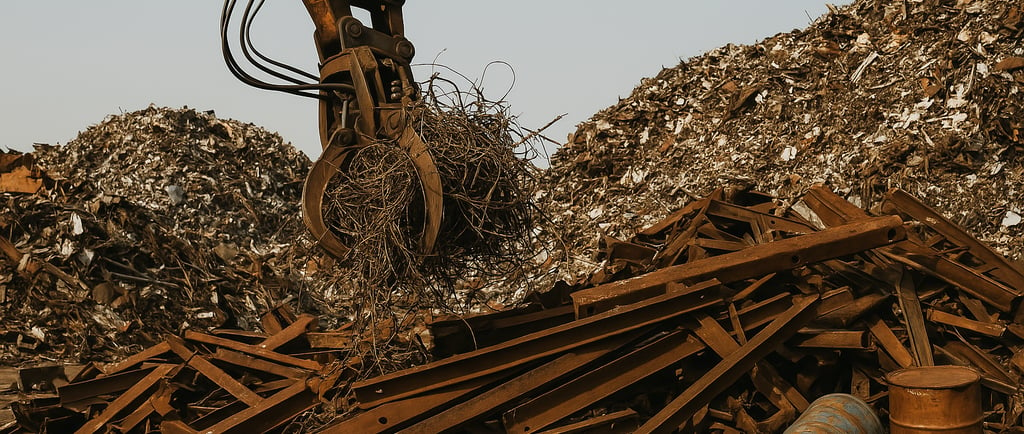Africa’s Growing Scrap Metal Market: Opportunities and Risks
Explore the rapidly growing scrap metal market in Africa, uncovering key opportunities, challenges, and future trends. Learn why now is the perfect time to invest in Africa's booming recycling industry.


The global metal supply chain is undergoing a seismic shift, and Africa is poised to become its next powerhouse. With soaring demand for sustainable raw materials, the continent’s scrap metal sector is attracting unprecedented attention from investors. However, navigating this burgeoning market requires a nuanced understanding of its opportunities, risks, and evolving dynamics.
The Rise of Africa’s Scrap Metal Market: Why Now?
1. A Resource-Rich Continent with Untapped Potential
Africa holds 30% of the world’s mineral reserves, including critical metals like copper, aluminum, and iron. Countries such as South Africa (iron ore), DRC (cobalt), and Zambia (copper) have historically focused on primary extraction. However, rapid urbanization and industrialization are driving a pivot toward recycling. For instance, South Africa recycles over 70% of its steel, aligning with global sustainability trends.
Data Spotlight:
The African metal recycling market is projected to grow at a 6.2% CAGR (2023–2030), fueled by $17 billion in infrastructure investments from the AfDB.
Urbanization rates in Sub-Saharan Africa are expected to reach 50% by 2030, generating 250 million tons of annual metal waste.
2. Global Demand: A Catalyst for Growth
Scrap metal is indispensable for industries like construction (40% of global steel demand) and electronics. With ore reserves depleting in China and India, these nations are turning to Africa. China’s scrap imports surged by 22% in 2023, driven by strict environmental laws restricting domestic mining. African exporters are capitalizing on this: Egypt and Nigeria exported over $1.2 billion in scrap metal to Asia in 2022.
Case Study:
Mombasa Port (Kenya) has streamlined customs processes for scrap exports, reducing shipment times by 30% and boosting regional trade.
Government Policies: Progress and Pitfalls
South Africa’s Export Restrictions
The 2022 Scrap Metal Export Control Amendment mandates that 50% of collected scrap be reserved for local manufacturers. While this supports domestic industries, exporters face delays and revenue losses. Critics argue the policy has spurred illegal trade, with $300 million in scrap metal smuggled annually via Mozambique.
Ghana’s Export Ban: A Double-Edged Sword
Ghana’s 2021 ban aimed to curb resource depletion but backfired, shrinking formal recycling revenues by 40% while inflating black-market prices. The government is now piloting “Recycling Zones” with tax breaks to attract formal investors.
Nigeria’s Green Incentives
Nigeria offers 15-year tax holidays for recycling plants, drawing firms like African Green Steel. Their Lagos plant processes 500,000 tons of scrap annually, supplying 20% of Nigeria’s construction steel.
Recommendation: Regional bodies like the African Union could harmonize policies through frameworks like the African Continental Free Trade Area (AfCFTA), reducing compliance costs for cross-border investors.
Opportunities: Where to Invest
1. Infrastructure-Led Recycling Growth
Mega-projects like Nigeria’s $2.8 billion Lagos-Calabar railway and South Africa’s Renewable Energy Independent Power Producer Programme (REIPPP) rely on recycled steel and aluminum. Companies like ScrapX (Kenya) partner with construction firms to collect and process onsite metal waste, cutting material costs by 25%.
2. Export Logistics Innovation
Investments in port modernization (e.g., Durban’s $7 billion expansion) and digital tracking systems (blockchain-based supply chains) can reduce export costs. Startups like Shipa (Egypt) offer real-time scrap pricing and logistics optimization, attracting European buyers.
3. Green Recycling Technologies
Adopting AI-driven sorting systems and electric arc furnaces (EAFs) can reduce emissions by 60%. The Africa Circular Economy Facility (ACEF) funds such projects, with Ghana’s first EAF plant set to open in 2025.
Challenges: Risks and Mitigation Strategies
1. Infrastructure Gaps
Only 30% of African roads are paved, increasing transport costs. Solution: Partner with governments on PPP models—e.g., Tanzania’s collaboration with DP World to build dedicated scrap rail corridors.
2. Price Volatility
Scrap prices fluctuate with China’s manufacturing cycles. Mitigation: Hedge risks by diversifying markets (e.g., targeting Türkiye and Vietnam) and securing long-term contracts.
3. Ethical and Environmental Risks
Informal collectors (60% of Africa’s scrap workforce) often lack protective gear, leading to health hazards. Best Practice: Adopt the RMI’s Responsible Recycling Standard and partner with NGOs like WIEGO to formalize labor networks.
Future Outlook: 4 Trends to Watch
Regional Recycling Hubs: ECOWAS plans to establish West Africa’s first scrap metal exchange in Accra by 2026.
Circular Economy Partnerships: The EU’s Global Gateway Initiative pledges €150 million for African recycling tech.
AI-Driven Recycling: Startups like RecycleBot (South Africa) use machine learning to optimize metal sorting.
Youth Employment: Kenya’s “Green Jobs for Youth” program aims to train 10,000 recyclers by 2025.
Conclusion: Strategic Investment is Key
Africa’s scrap metal industry is a high-reward, high-risk frontier. Investors must adopt a dual strategy:
Short-Term: Target stable markets like South Africa and Egypt, leveraging tax incentives.
Long-Term: Advocate for policy harmonization and invest in green tech to future-proof operations.
With the right partnerships and innovation, Africa could supply 40% of global scrap metal by 2040—transforming waste into wealth.
Would you like to explore expert insights or strategic investment strategies? Subscribe to industry reports and stay ahead of emerging opportunities in this dynamic market! 🚀
